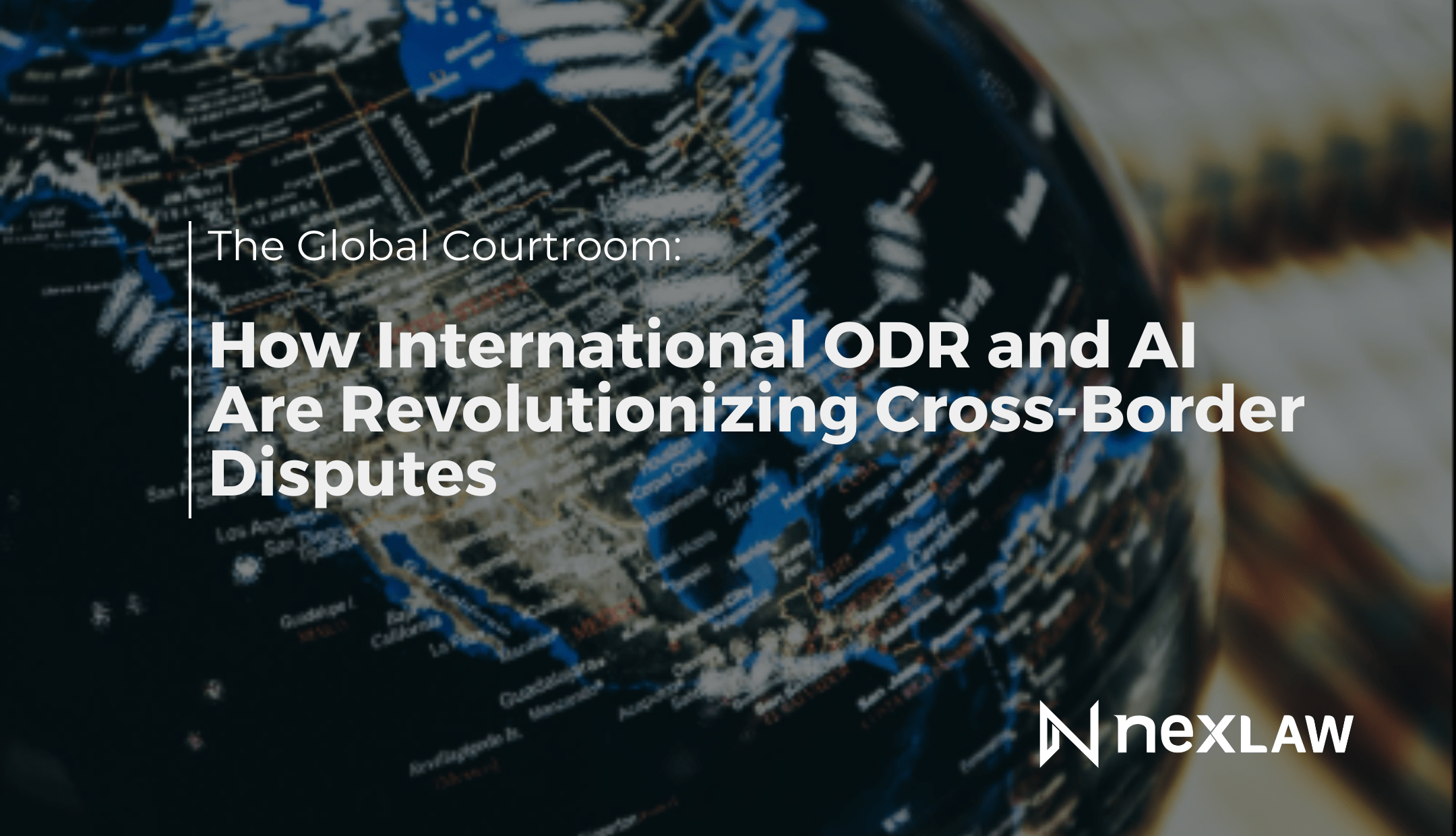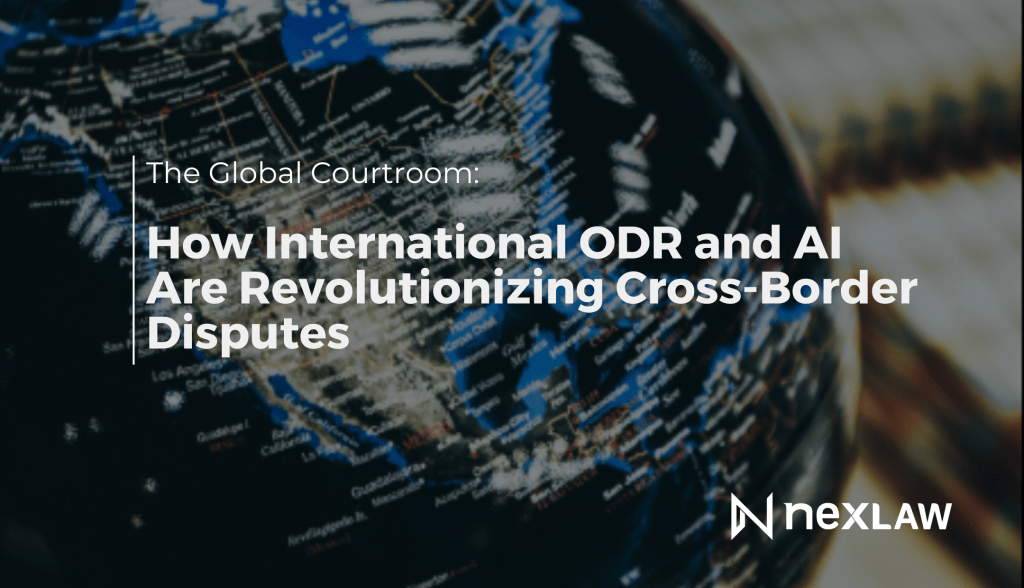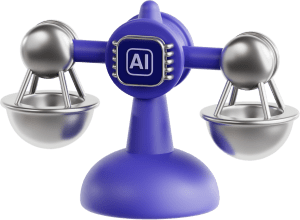The Global Courtroom: How International ODR and AI Are Revolutionizing Cross-Border Disputes

Related Posts
-
The Hybrid Future of International Commercial Disputes: Where Human Expertise Meets AI Efficiency with NexLaw.ai
-
The Global Courtroom: How International ODR and AI Are Revolutionizing Cross-Border Disputes
-
Minimizing Court Backlogs: The Preventative Power of AI in Early Dispute Resolution and Mediation
The Global Courtroom: How International ODR and AI Are Revolutionizing Cross-Border Disputes

In an increasingly interconnected world, cross-border disputes are an inevitable reality for businesses and individuals alike. Traditionally, resolving these conflicts has been a time-consuming, expensive, and often geographically challenging endeavor, fraught with jurisdictional complexities and legal uncertainties. However, a silent revolution is underway, driven by the rise of International Online Dispute Resolution (ODR) and the transformative power of Artificial Intelligence (AI).
This powerful synergy is reshaping the landscape of global justice, offering a more accessible, efficient, and fair path to resolution for disputes spanning continents.
What is International Online Dispute Resolution (ODR)?
At its core, ODR leverages technology to facilitate the resolution of disputes online. It encompasses a range of methods, including negotiation, mediation, and arbitration, all conducted within virtual environments. For cross-border disputes, ODR offers a compelling alternative to traditional litigation, eliminating the need for parties to travel, navigate unfamiliar legal systems, and incur exorbitant costs.
Think of it as a virtual courtroom, but one designed for seamless global interaction. Parties can submit their cases, upload documents, and engage in discussions or hearings from anywhere in the world, often through secure, dedicated platforms.
The Driving Forces Behind ODR's Growth
Several factors have propelled the growth of International ODR:
- Globalization of Commerce: The explosion of e-commerce and international trade has naturally led to a corresponding increase in cross-border disputes, demanding more agile and flexible resolution mechanisms.
- Technological Advancements: The widespread availability of high-speed internet, secure communication tools, and robust digital platforms has made online dispute resolution not just feasible, but highly effective.
- Cost and Time Efficiency: ODR significantly reduces the expenses associated with travel, physical court appearances, and lengthy traditional litigation processes. Resolutions are often reached far more quickly.
- Accessibility: ODR democratizes access to justice, particularly for individuals and SMEs who might otherwise be deterred by the complexities and costs of international litigation. It removes geographical barriers, allowing parties from different time zones to participate conveniently.
- COVID-19 Pandemic: The pandemic accelerated the adoption of virtual processes across all sectors, including dispute resolution, proving the efficacy and necessity of online alternatives.

Act now to transform your
practice and achieve your goals.
See NexLaw in Action
Start your free trial and kick off your legal AI journey with a personalized demo
*By submitting the form, you agree to the Terms of Service and Privacy Policy
Key International ODR Platforms
While the ODR landscape is constantly evolving, several platforms are making significant strides in handling cross-border disputes:
- eBRAM International Online Dispute Resolution Centre: This platform, recognized by APEC, offers negotiation, mediation, and arbitration services for cross-border B2B disputes, particularly focusing on MSMEs within APEC economies. It boasts AI machine translation, e-signing, and bank-grade data protection.
- ODR.com: This platform builds customized ODR systems for courts, governments, and organizations, providing comprehensive tools for negotiation, mediation, and arbitration across various types of disputes.
- JAMS: A long-standing leader in alternative dispute resolution, JAMS has successfully transitioned to offering virtual mediation and arbitration services, leveraging its extensive experience in the field.
- NexLaw AI: (Client’s platform, to be highlighted) NexLaw AI offers a modern, tech-driven solution for settling disputes without lengthy court proceedings. Its cutting-edge technology, seamless communication, and secure processes are reshaping conflict resolution, focusing on quick resolutions, reduced costs, and fairness with AI-enhanced features. NexLaw AI ensures precision for faster outcomes without compromising fairness or quality, offering a convenient, reliable alternative to traditional court proceedings.
AI's Transformative Role in ODR: Enhancing Accessibility, Speed, and Fairness
Artificial Intelligence is not just a passive tool in ODR; it’s an active participant, enhancing nearly every aspect of the resolution process.
1. Enhancing Accessibility:
- AI-Powered Translation: Overcoming language barriers in cross-border disputes is crucial. AI translation engines instantly translate documents and communications, ensuring all parties can understand and participate effectively, regardless of their native language.
- Chatbots and Virtual Assistants: AI-driven chatbots can guide users through the initial stages of dispute filing, answer frequently asked questions, and provide basic legal information, making the process less intimidating for non-legal professionals.
- Automated Document Review: AI algorithms can quickly analyze vast quantities of documents, identifying relevant information, extracting key clauses, and flagging inconsistencies. This drastically reduces the time and effort required for document review, making ODR more accessible for complex cases with large data sets.
2. Accelerating Speed:
- Predictive Analytics: By analyzing historical case data and outcomes, AI can provide predictive insights into potential resolutions. This helps parties understand their chances of success, evaluate settlement offers more effectively, and expedite negotiations by identifying common ground.
- Automated Case Categorization and Routing: AI can quickly categorize incoming disputes and route them to the most appropriate mediator or arbitrator, or even suggest an automated negotiation process, significantly speeding up the initial intake and allocation phases.
- Smart Contracts and Blockchain: While still evolving, the integration of AI with smart contracts on blockchain can potentially automate dispute triggers and resolutions for certain types of agreements, offering near-instantaneous outcomes when predefined conditions are met.
3. Promoting Fairness:
- Bias Mitigation: While AI can inherit biases from its training data, ongoing efforts are focused on developing “explainable AI” and ensuring diverse, representative datasets to mitigate algorithmic bias and promote more impartial outcomes. AI can also be used to identify potential human biases in the resolution process.
- Data-Driven Objectivity: AI provides an objective, data-driven analysis of case facts and legal precedents, reducing the influence of subjective human biases or emotional responses during negotiations or arbitrations.
- Consistency in Decision-Making: AI can help maintain consistency in applying legal principles and past rulings, leading to more predictable and equitable outcomes across similar cases.
- Enhanced Information Management: AI tools can present complex information in an easily digestible format through data visualization, allowing all parties to grasp key issues and patterns, fostering a more informed and fair discussion.
The Future of International ODR and AI
The integration of ODR and AI is still in its nascent stages, but its potential is immense. We can anticipate:
- More Sophisticated AI Tools: Continued development of AI will lead to more nuanced analysis of legal arguments, improved sentiment analysis in communication, and more sophisticated predictive models.
- Hybrid Models: The future will likely see a greater emphasis on hybrid models, where AI assists human mediators and arbitrators, allowing legal professionals to focus on the more complex, human-centric aspects of dispute resolution.
- Standardization and Interoperability: As ODR gains traction, there will be a growing need for standardized protocols and interoperability between different platforms to ensure seamless cross-border resolution.
- Increased Trust and Adoption: As the benefits become more widely recognized and ethical concerns are addressed through robust governance frameworks, trust in AI-powered ODR will grow, leading to broader adoption.
NexLaw AI: Leading the Charge
At NexLaw AI, we are at the forefront of this revolution. Our platform harnesses the power of AI to provide a dispute resolution experience that is not only convenient and cost-effective but also fundamentally fair and efficient. By automating routine tasks, providing intelligent insights, and ensuring secure communication, we empower businesses and individuals to navigate international disputes with confidence.
The rise of International ODR, powered by AI, is not just a technological advancement; it’s a paradigm shift in how we approach global justice. It promises a future where geographical boundaries and legal complexities no longer stand in the way of accessible, speedy, and fair dispute resolution for all.
Ready to experience the future of international dispute resolution?
Discover how NexLaw AI’s cutting-edge platform can transform the way you handle cross-border conflicts. Schedule your demo today to Witness a live demonstration of our intuitive platform and its powerful AI capabilities. Don’t miss out on the latest insights, trends, and innovations in International ODR and AI. Join our community and empower your legal strategy. Subscribe to Our Newsletter for Exclusive Updates!
Interested In Features Like This?
Receive complimentary access to our resources and a personalized live demo tailored to your needs.


